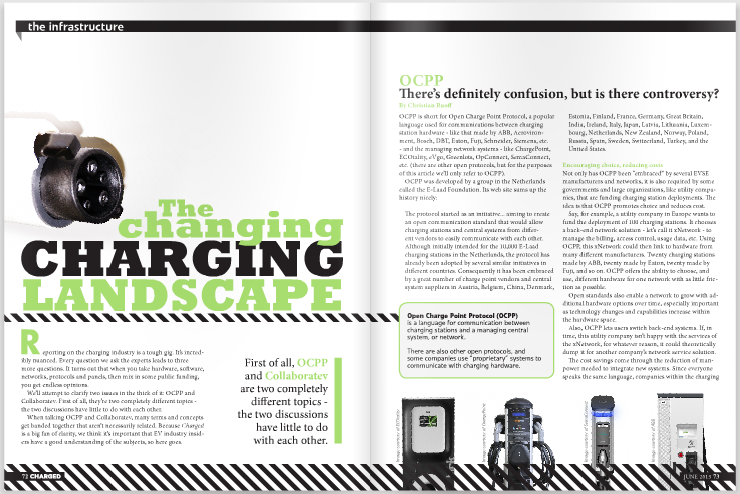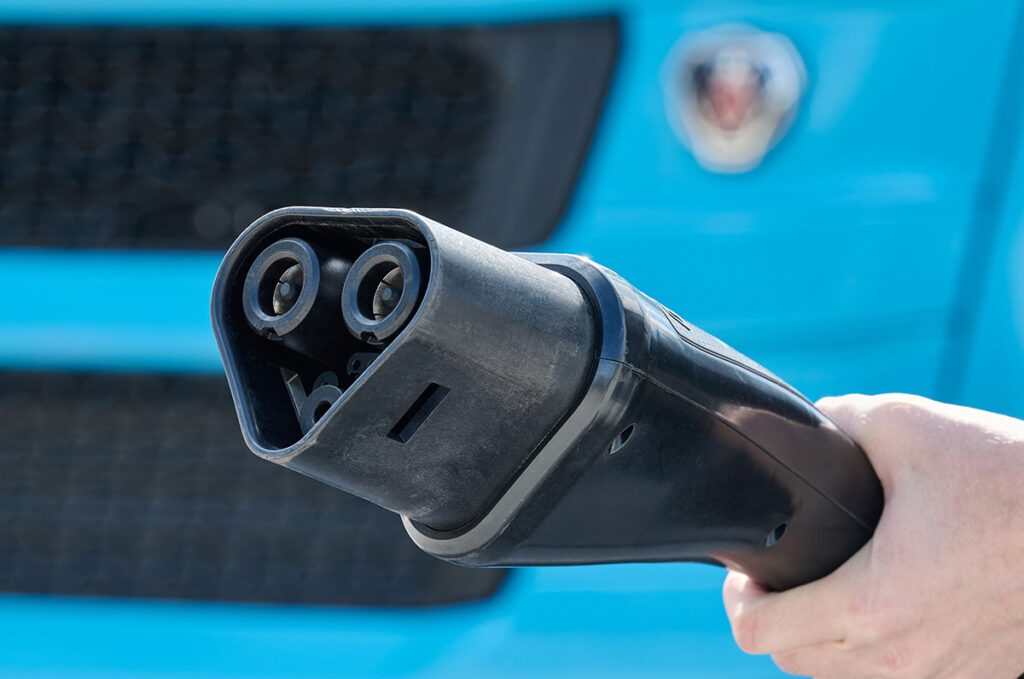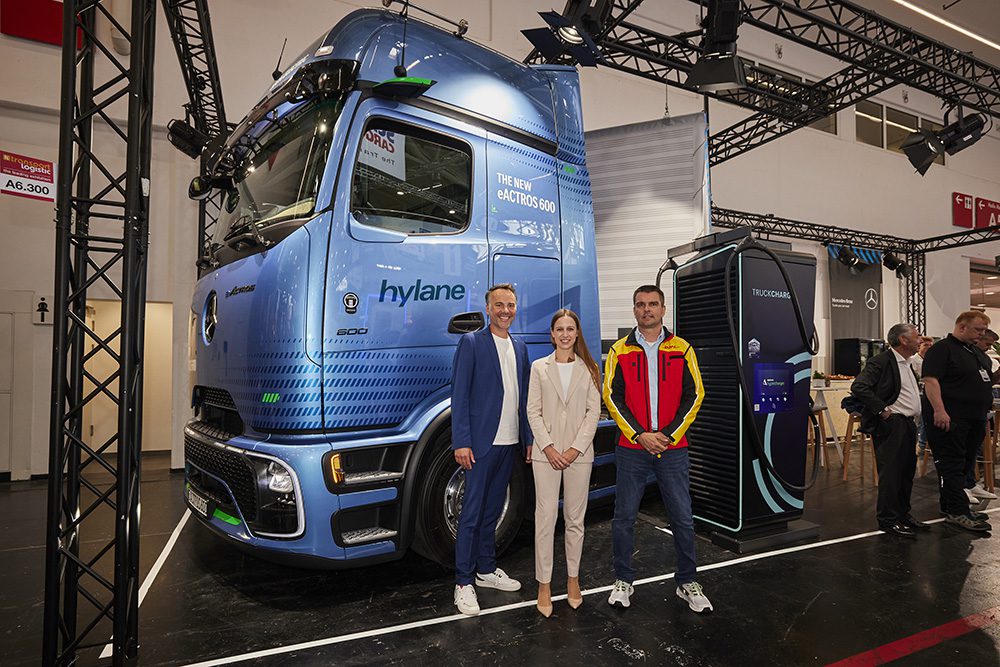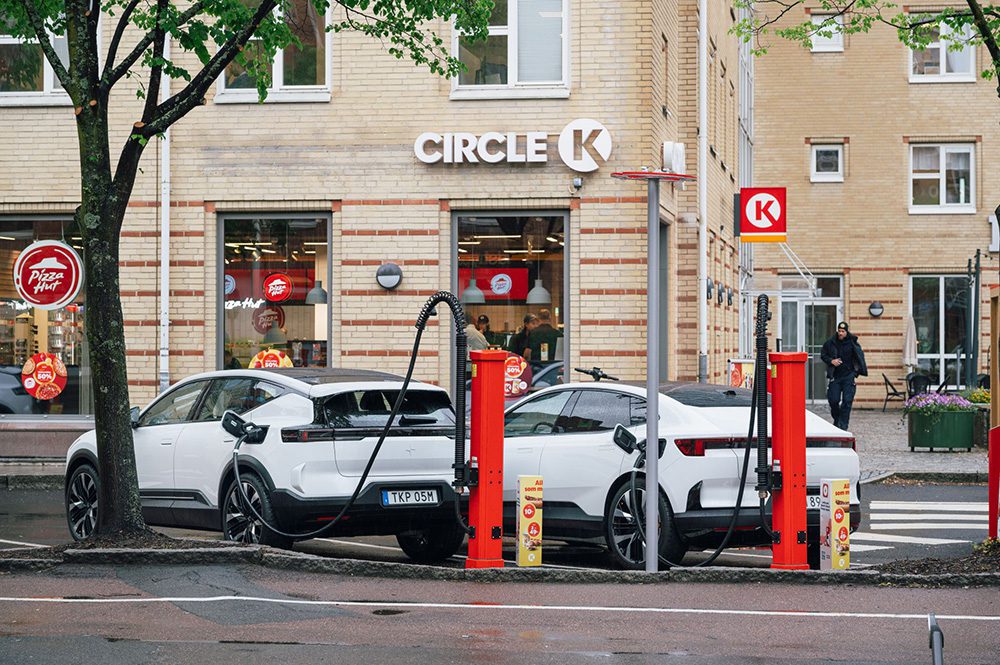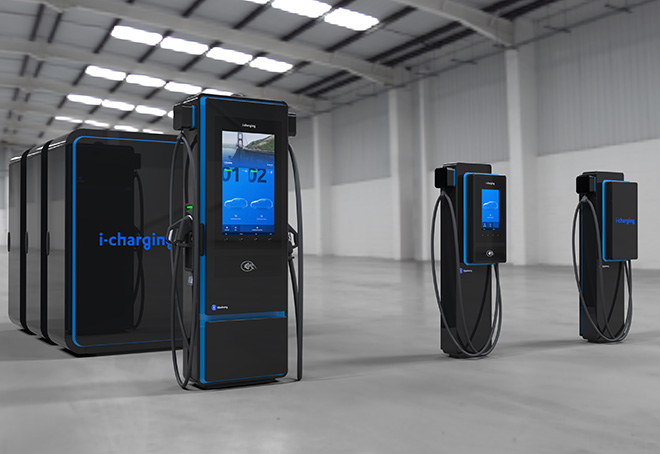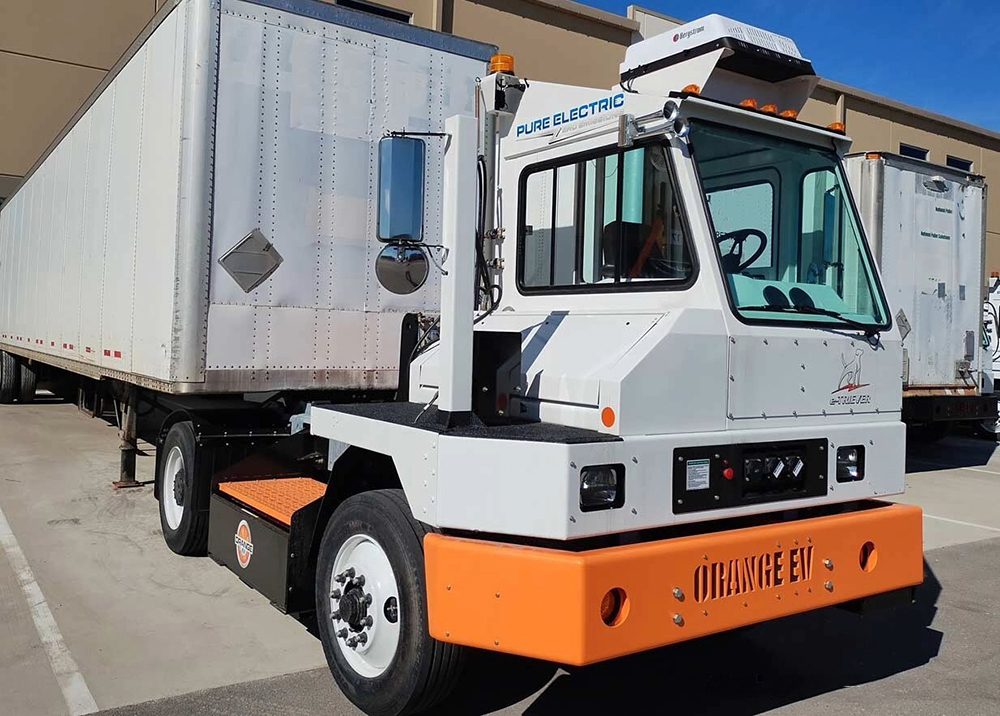Reporting on the charging industry is a tough gig. It’s incredibly nuanced. Every question we ask the experts leads to three more questions. It turns out that when you take hardware, software, networks, protocols and panels, then mix in some public funding, you get endless opinions.
We’ll attempt to clarify two issues in the thick of it: OCPP and Collaboratev. First of all, they’re two completely different topics – the two discussions have little to do with each other.
When talking OCPP and Collaboratev, many terms and concepts get banded together that aren’t necessarily related. Because Charged is a big fan of clarity, we think it’s important that EV industry insiders have a good understanding of the subjects, so here goes.
______
OCPP is short for Open Charge Point Protocol, a popular language used for communications between charging station hardware – like that made by ABB, Aerovironment, Bosch, DBT, Eaton, Fuji, Schneider, Siemens, etc. – and the managing network systems – like ChargePoint, ECOtality, eVgo, Greenlots, OpConnect, SemaConnect, etc. (there are other open protocols, but for the purposes of this article we’ll only refer to OCPP).
OCPP was developed by a group in the Netherlands called the E-Laad Foundation. Its web site sums up the history nicely:
The protocol started as an initiative… aiming to create an open communication standard that would allow charging stations and central systems from different vendors to easily communicate with each other. Although initially intended for the 10,000 E-Laad charging stations in the Netherlands, the protocol has already been adopted by several similar initiatives in different countries. Consequently it has been embraced by a great number of charge point vendors and central system suppliers in Austria, Belgium, China, Denmark, Estonia, Finland, France, Germany, Great Britain, India, Ireland, Italy, Japan, Latvia, Lithuania, Luxembourg, Netherlands, New Zealand, Norway, Poland, Russia, Spain, Sweden, Switzerland, Turkey, and the United States.
Encouraging choice, reducing costs
Not only has OCPP been “embraced” by several EVSE manufacturers and networks, it is also required by some governments and large organizations, like utility companies, that are funding charging station deployments. The idea is that OCPP promotes choice and reduces cost.
Say, for example, a utility company in Europe wants to fund the deployment of 100 charging stations. It chooses a back-end network solution – let’s call it xNetwork – to manage the billing, access control, usage data, etc. Using OCPP, this xNetwork could then link to hardware from many different manufacturers. Twenty charging stations made by ABB, twenty made by Eaton, twenty made by Fuji, and so on. OCPP offers the ability to choose, and use, different hardware for one network with as little friction as possible.
Open standards also enable a network to grow with additional hardware options over time, especially important as technology changes and capabilities increase within the hardware space.
Also, OCPP lets users switch back-end systems. If, in time, this utility company isn’t happy with the services of the xNetwork, for whatever reason, it could theoretically dump it for another company’s network service solution.
The cost savings come through the reduction of manpower needed to integrate new systems. Since everyone speaks the same language, companies within the charging industry don’t need to spend time and money integrating with each other – there’s less non-recurring engineering. By going out to bid for OCPP-enabled systems, an owner can save significant time bringing together the multiple vendors required for functioning infrastructure, effectively streamlining the bid process. Ideally, the savings are passed on to customers.
Controversy?
In the US, however, OCPP hasn’t quite swept across the charging industry as it has elsewhere, and much of the EVSE that has been deployed was designed prior to OCPP being widely adopted.
The US OCPP controversy mainly stems from the fact that two companies (ECOtality and ChargePoint) have been the largest recipients of the government grants that kick-started the industry, and they don’t exclusively use OCPP. In many cases those networks use proprietary communication protocols that are unique to each company. The gist of the gripe is that tax money was spent to give these companies a stranglehold on these publicly-funded installs – “vendor lock-in,” as some call it.
 If the station owners, or site hosts, want to switch networks, they will need to switch hardware too (but, again, this is not why there is a need for an organization like Collaboratev – that’s a different issue).
If the station owners, or site hosts, want to switch networks, they will need to switch hardware too (but, again, this is not why there is a need for an organization like Collaboratev – that’s a different issue).
Many believe that if everyone fully adopted OCPP, then charging station site hosts would be able to switch network providers at will. But that is not necessarily true. The rub is that even if these two US market leaders fully embrace OCPP – and ChargePoint CEO Pat Romano told us they plan to in time – it doesn’t mean that existing charging stations could be easily moved to other networks. Even if a station protocol has a common syntax, there can still be custom code in the station that only allows it to talk to the network it was originally designed to talk to. A station authenticates by using an encrypted certificate-based authentication on both sides, so it can say, “If I’m not talking to my network, I’m not talking – OCPP or no OCPP.” You can especially expect this bias from network vendors that also supply the station hardware, as ChargePoint and ECOtality do in many instances. Essentially, the companies would have to cooperate with a charging station takeover by another network.
 So, why does ChargePoint currently support OCPP and intend to eventually migrate its whole network? Because it allows new hardware manufacturers to integrate with network companies, like ChargePoint, with less effort.
So, why does ChargePoint currently support OCPP and intend to eventually migrate its whole network? Because it allows new hardware manufacturers to integrate with network companies, like ChargePoint, with less effort.
Should the government mandate that network providers make it possible, or easy, for their services to be replaced by competitors? (Insert your opinion here.) It’s unlikely that such an order will be handed down in the US, at least for business deals between two private companies. So, the customer needs to be savvy enough to say, “I want a solution that allows me the freedom to fire you if I’m not happy, or to easily switch network providers if you go out of business.”
A slightly more realistic scenario would be a mandate that public funds can only be spent on systems that promote the ultimate amount of choice, and the minimal amount of possible vendor lock-in. This is the case in much of Europe, where the attitude seems to be, “It’s our tax money, so your company should have to compete to get it, and continually fight to keep that business.”
However, it’s a little late for that debate in the US. The pile of American Recovery and Reinvestment Act cash (aka Obama’s 2009 Stimulus) has come and gone, and OCCP wasn’t mandated, for whatever reason, when that dough was dished out. So, what is there to do now?
What do you say we put that policy in place for future use of public funds, everybody drop it, and we move on in the name of progress? After all, the charging industry is very young, not even out of diapers yet. ChargePoint is the early US leader with only about 12,000 charging ports, hardly a monopoly on parking spots.
Quick solutions to any sort of industry infighting are ideal, but don’t hold your breath waiting for this discussion to end.
(Have an opinion? Letters to the editor can be sent to info@ChargedEVs.com.)
What we know about Collaboratev >
This article originally appeared in Charged Issue 8 – JUN 2013






